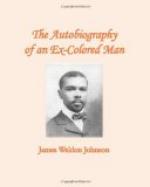When I reached Macon, I decided to leave my trunk and all my surplus belongings, to pack my bag, and strike out into the interior. This I did; and by train, by mule and ox-cart, I traveled through many counties. This was my first real experience among rural colored people, and all that I saw was interesting to me; but there was a great deal which does not require description at my hands; for log cabins and plantations and dialect-speaking “darkies” are perhaps better known in American literature than any other single picture of our national life. Indeed, they form an ideal and exclusive literary concept of the American Negro to such an extent that it is almost impossible to get the reading public to recognize him in any other setting; so I shall endeavor to avoid giving the reader any already overworked and hackneyed descriptions. This generally accepted literary ideal of the American Negro constitutes what is really an obstacle in the way of the thoughtful and progressive element of the race. His character has been established as a happy-go-lucky, laughing, shuffling, banjo-picking being, and the reading public has not yet been prevailed upon to take him seriously. His efforts to elevate himself socially are looked upon as a sort of absurd caricature of “white civilization.” A novel dealing with colored people who lived in respectable homes and amidst a fair degree of culture and who naturally acted “just like white folks” would be taken in a comic-opera sense. In this respect the Negro is much in the position of a great comedian who gives up the lighter roles to play tragedy. No matter how well he may portray the deeper passions, the public is loath to give him up in his old character; they even conspire to make him a failure in serious work, in order to force him back into comedy. In the same respect, the public is not too much to be blamed, for great comedians are far more scarce




